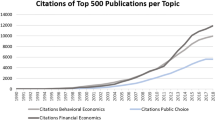Abstract
Public choice is the study of behaviour at the intersection of economics and political science. Constitutional political economy provides important insights into the relationship between effective constitutions and the behaviour of ordinary political markets. The use of the public choice analysis in politics and economics has overall not been as successful in policy advice and is not as important in overall economics as we, the public choice scholars, wish it to be. The victory of public choice in mainstream economics may not yet have arrived, and the share of public choice contributions remains small. Nevertheless, I am convinced that there will be a great future in public choice.
Access provided by Autonomous University of Puebla. Download chapter PDF
Similar content being viewed by others
Public choice is the study of behaviour at the intersection of economics and political science. An important branch of public choice, constitutional political economy provides important insights into the relationship between effective constitutions and the behaviour of ordinary political markets.
According to Dennis C. Mueller (2003, p. 395), ‘Public Choice can be defined as the economic study of nonmarket decision-making, or, simply the application of economics to political science. The basic behavioral postulate of public choice, as for economics, is that man is an egoistic, rational, utility maximizer’.
In the book Public Choice III, the following major areas are covered:
Why a state exists, voting rules, federalism, the theory of clubs, two-party and multiparty electoral systems, rent seeking, bureaucracy, interest groups, dictatorship, the size of government, voter participation, political business cycles, and contemporary political economy.
Hence, public choice is the study of behaviour at the intersection of economics and political science. Since the 1940s, public choice has developed a rich literature, drawing from such related perspectives as history, philosophy, law and sociology, to analyse political decision-making (by citizen-voters, elected officials, bureaucratic administrators, lobbyists and other ‘rational’ actors) in social and economic context, with an emphasis on identifying differences between individual goals and collective outcomes. An important branch of public choice, constitutional political economy provides important insights into the relationship between effective constitutions and the behaviour of ordinary political markets.
Over the last 25 years, the use of the public choice analysis in politics and economics has overall not been as successful in policy advice and is not as important in overall economics as we, the public choice scholars, wish it to be. Hence, the victory of public choice in mainstream economics may not yet have arrived, and the share of public choice contributions remains small. Nevertheless, I am convinced that there will be a great future in public choice, as we face many political and economic problems (like should we have a European contribution, a debt brake, more federalism, etc.).
In addition, the European contribution to the future development of public choice may well consist in the introduction of new public-choice-orientated theories about the evolution of institutions and of new aspects of human behaviour. Especially the great variety of European economic and political institutions provides good opportunities to undertake this type of research for public choice scholars. In these fields, there are promising chances for a public choice perspective, and if young social science researchers take up these points, ideas in public choice will play a dominant role. Especially the latest development in Europe, which we can observe in many economic and/or political transformations, shows that there is a huge chance for public choice scholars to go into these areas, to be engaged in this type of research and to play a key role using the public choice analysis in the future.
To summarize, we should not forget the pioneering work of Dennis C. Mueller, Public Choice III, published in 2003. This book provides an excellent, intellectually challenging, and forward-looking tool in economics for this century.
Literature
Mueller, D. C. (2003). Public choice III. Cambridge: Cambridge University Press.
Author information
Authors and Affiliations
Corresponding author
Editor information
Editors and Affiliations
Rights and permissions
Copyright information
© 2019 Springer Nature Switzerland AG
About this chapter
Cite this chapter
Schneider, F. (2019). Friedrich Schneider Recommends “Public Choice III” by Dennis C. Mueller. In: Frey, B., Schaltegger, C. (eds) 21st Century Economics. Springer, Cham. https://doi.org/10.1007/978-3-030-17740-9_42
Download citation
DOI: https://doi.org/10.1007/978-3-030-17740-9_42
Published:
Publisher Name: Springer, Cham
Print ISBN: 978-3-030-17739-3
Online ISBN: 978-3-030-17740-9
eBook Packages: Economics and FinanceEconomics and Finance (R0)




